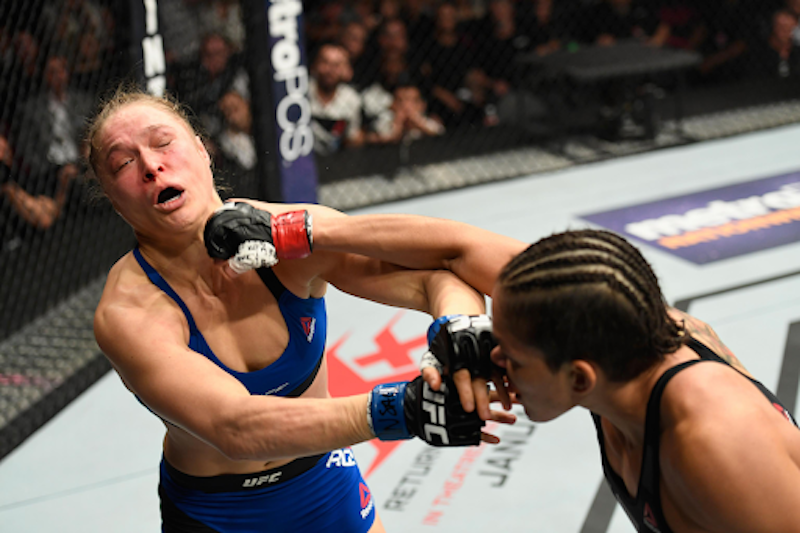When I recently reviewed Ronda Rousey's risible second autobiography, Our Fight, for RealClear Books & Culture, it became apparent how her delusional and self-centered personality shone through—a personality that inadvertently prevented her from embracing the role of the bad guy in professional wrestling, a role she was unwittingly perfect for. Instead of capitalizing on her innate ability to polarize audiences, Rousey’s narrative in her autobiography reveals a steadfast commitment to being seen as the hero of her own story, missing the opportunity to craft a character that could’ve been one of wrestling's most compelling villains.
In the UFC, Rousey played the part of an unstoppable juggernaut, decimating opponents until she encountered elite strikers Holly Holm and later Amanda Nunes. Rather than acknowledging the resulting knockouts as genuine defeats, Rousey's Our Fight portrays them as mere accidents; mere misfortunes where her so-called "perfect" grappling system faltered not due to superior skill but because of her hard-earned Achilles' heel—her vulnerability to head strikes, a self-admitted "eggshell skull" resulting from decades of concussions sustained during her judo career. This reinterpretation of her losses as anomalies rather than legitimate defeats is a prime example of her delusional self-perception, which could’ve been gold in the wrestling world.
The narrative Rousey crafts is Shakespearean in its tragedy; she’s the hero in her mind, unaware of her role as the architect of her downfall. Her unyielding belief in her own invincibility and her dismissal of any faults or failures create a pouty-faced character that’s inherently unlikeable and yet fascinating. As her career shifted to WWE, this character could’ve thrived, given the sports entertainment industry's penchant for larger-than-life personas and dramatic story arcs. Yet, Rousey resisted this natural progression, desperate to cling to a heroic facade that clashed with the audience's perception, evidenced by their reactions—boos filled arenas, critiquing her monotonous in-ring performances and lackluster microphone skills.
This dissonance between Rousey's self-image and public reception underscores what could’ve been an iconic wrestling heel. Wrestling's narrative thrives on clear-cut roles, and the heel is as vital as the hero. Rousey's real-life traits—arrogance, entitlement, and her provocative declarations in Our Fight—form the perfect foundation for such a villain. Imagine a character who dominates with undeniable prowess yet is constantly haunted by that one well-placed strike that can bring her downfall; such an arc made Bill Goldberg’s late-career series with fellow failed-to-launch MMA legend Brock Lesnar so compelling, because Goldberg would either beat Lesnar in seconds or lose in minutes. This character would never accept defeat gracefully, instead spinning every loss as a fluke, perpetuating the narrative of her invincibility.
Such a character would not only be true to the essence of Rousey's public persona as painted by her autobiography but also resonate with wrestling fans who relish complex, flawed antagonists. This heel would boast about her achievements, dismiss the crowd's favorites, and provoke outrage with her smug superiority. She'd embody the "kill or be killed" philosophy, claiming that every fight is a life-or-death struggle she must dominate and arguing that one-punch knockouts weren’t really losses because exploiting her preexisting weakness proved nothing. Furthermore, the one-punch flash defeat is something that modern pro wrestling lacks; most matches are 50/50 affairs, even when one competitor outweighs the other by 100 pounds, and all seem to follow a predictable course to the finish, with a bunch of two-counts (but never one-counts building to two-counts, because then the crowd couldn’t chant “too sweet”) increasing until a pin occurs.
Moreover, Rousey's relationships with MMA figures like Shayna Baszler, Marina Shaffir, and her husband Travis Browne could be woven into the storyline, providing depth and personal stakes. Her disdain for traditional training methods, preference for smoking pot over weightlifting, and even her strange, condescending views on her friends' appearances—Browne is just a tall, bald guy; Shaffir is the Eastern European, Jewish equivalent of Rousey; Baszler has a large rear end that Rousey can’t help mentioning—could’ve all served to enhance her creepy-heel persona, making her someone fans love to hate.
Her autobiography insists on her flawlessness and shows an unwillingness to introspect or learn from setbacks, adding another layer to this villain character. She’d forever be twisting unflattering outcomes to maintain her tarnished glory—“How can they really have beaten me if I can’t even remember one second of the fight?” She could use her time on camera to constantly rewrite her own history, manipulating narratives much like she accuses the WWE and media of doing. This manipulation, coupled with her undeniable prowess in performing in the very limited role of a trumped-up badass who either wins quickly by armbar or gets “KTFO,” would make her a character like no other.
In wrestling, the best characters often blur the lines between their real-life personas and their in-ring alter egos. Ronda Rousey, through her own narratives, provides all the ingredients necessary for a remarkable wrestling heel: a formidable yet vulnerable combatant, a self-assured yet delusional champion, and a misunderstood antagonist who perceives herself as the protagonist. This persona could’ve revolutionized her wrestling career, aligning her true strengths and weaknesses with her storyline, making her not just a character to be watched but one to be emotionally invested in. Who wouldn’t want to see someone like this lose over and over? And what smart wrestling promoter wouldn’t withhold this outcome until not just the last minute, but the very last second.
Rousey's autobiographical works don’t just offer an unfiltered glimpse into her career; they inadvertently lay out a blueprint for one of wrestling's most unique and captivating characters. Her real-life journey, filled with hubris, denial, and unyielding excuses, could’ve been masterfully transformed into the "monster bad guy" that women’s wrestling desperately needs (big Nia Jax and Nyla Rose are serviceable in limited doses, but beyond that, they ain’t it, chief). Unfortunately, her insistent portrayal as the hero in her own narrative likely cost her the opportunity to engage and captivate the wrestling world in a manner that her in-ring abilities alone could never fully realize.

